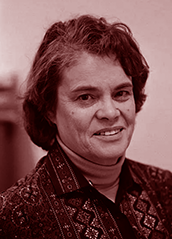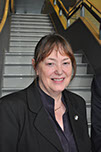
DOROTHY THOMPSON
“The Doyenne of Chartist Studies”

This year's CHARTISM DAY was held at the University of Reading on Saturday 07 September 2024 and dedicated to the memory of the doyenne of Chartist studies, Dr Dorothy Thompson.
Les James, Editor of CHARTISM eMAG and Grace Handworker-French attended the day and report:
A century has passed since the birth (October 1923) of the eminent Chartist historian Dorothy Thompson. She was very much, the founder of what in the 1990s became Chartism Day, creating a forum in which virtually every Chartist historian of the past thirty years has been able to test their ideas.
Many of those present had memories of her to share and Joan Allen led the way in her opening address. Dr Allen recalled her first meeting with Dorothy Thompson.
It was a small seminar that ‘Dottie’, as she was known to her friends, had brought together in 1993 at the University of Birmingham, where she was teaching. This was the start of what became Chartism Day. Dr Allen admits that she was “completely in awe of being in such stellar company and ever so slightly terrified.” And with good reason, it was generally acknowledged that Dr Thompson was a formidable character. She had an unflinching gaze that could sometimes make people feel uncomfortable. She certainly did not suffer fools gladly and close questioning was her trademark. When she subjected younger academics to her forensic questioning on their work, this was in fact a sign that they had actually captured her attention and interest. Dr Allen found that she put her immediately at ease and it wasn’t long before she came to know ‘Dottie’ well. …. “When I later took over the role as convenor of Chartism Day, she pressed into my hand a copy of The Chartist Experience, she had edited with Jim Epstein in 1982. That I will always treasure.”
Dr. Thompson was an activist as much as a political historian. When we think about her achievements and her pre-eminent position as the leading historian of Chartism, Dr Allen believes it is essential that we remember that whilst she was gathering her sources and publishing ground breaking work on Chartist poetry, she was also running a household, bringing up three children, campaigning for peace and social reform at both the national and local level. Her activism underpinned her understanding of the practicalities of sustaining the long political struggle for democracy and electoral reform. She firmly believed that Chartism could only be properly understood by those who had themselves been politically active.
These other commitments undoubtedly delayed her own publications and her academic career but Dr Allen believes that taking the time, allowed Dorothy Thompson to gather invaluable primary sources and fully distil her ideas. Also, Dorothy and her husband Edward (E.P.) Thompson discussed ideas together, “working either side of a large table – you can just imagine the conversation”. This approach had helped both historians to develop their thinking.
The rush to print that marks academia today is not necessarily the best way to write History. Dr Allen argues that the years that Dorothy devoted to producing the mammoth first Bibliography of the Chartist Movement (1978), with JFC Harrison, certainly contributed to the depth of knowledge that was the hallmark of all her work. The revisionist work that emerged, particularly her 1984 study The Chartists, was as cogent as it was complex. She produced significant works that have opened up our understanding of the history of Chartism. Deservedly considered to be “the doyenne of Chartist studies”, she produced work with which present day historians still need to engage. If her doctoral students were pushed to work extremely hard they benefited from her unfailing generosity as she shared the rare source materials she had painstakingly gathered and spent many hours discussing their ideas.
Dr Allen concluded that “Today, I want to highlight her inspiration in setting on foot our Chartist conferences because so much of what is new in Chartist Studies has been initiated in our annual events. It was her ambition to bring together scholars of all disciplines, emerging postgraduates and early career researchers and the wider public and so it has proved. Our meetings are her legacy.
Until her death in 2011, Dorothy was a regular attendee at Chartism Days and I have many happy memories of being in her company, most notably the first of two visits to Great Dodford in Worcestershire. By the time of the second we were able to tour the National Trusts latest acquisition: Rosedene a newly discovered Land Plan cottage. Of course, Dorothy had been closely involved in its identification and restoration.
As Neville Kirk wrote in her festschrift, The Duty of Discontent, Dorothy ‘displayed an independence and toughness of mind and practice…her legacy of accurate, detailed, well researched and considered historical work was rooted in the unending dialogue between concept and evidence’. I like to think that she would have relished hearing all the papers being delivered today.”

 Dr JOAN ALLEN (Newcastle University) is a member of the Newport Chartist Convention Planning Committee, Academic Adviser to CHARTISM eMAG and board members of Six Points Publishers. Joan has for many years, been convenor on behalf of the Society for the Study of Labour History, at the annual Chartism Day Conference.
Dr JOAN ALLEN (Newcastle University) is a member of the Newport Chartist Convention Planning Committee, Academic Adviser to CHARTISM eMAG and board members of Six Points Publishers. Joan has for many years, been convenor on behalf of the Society for the Study of Labour History, at the annual Chartism Day Conference.









